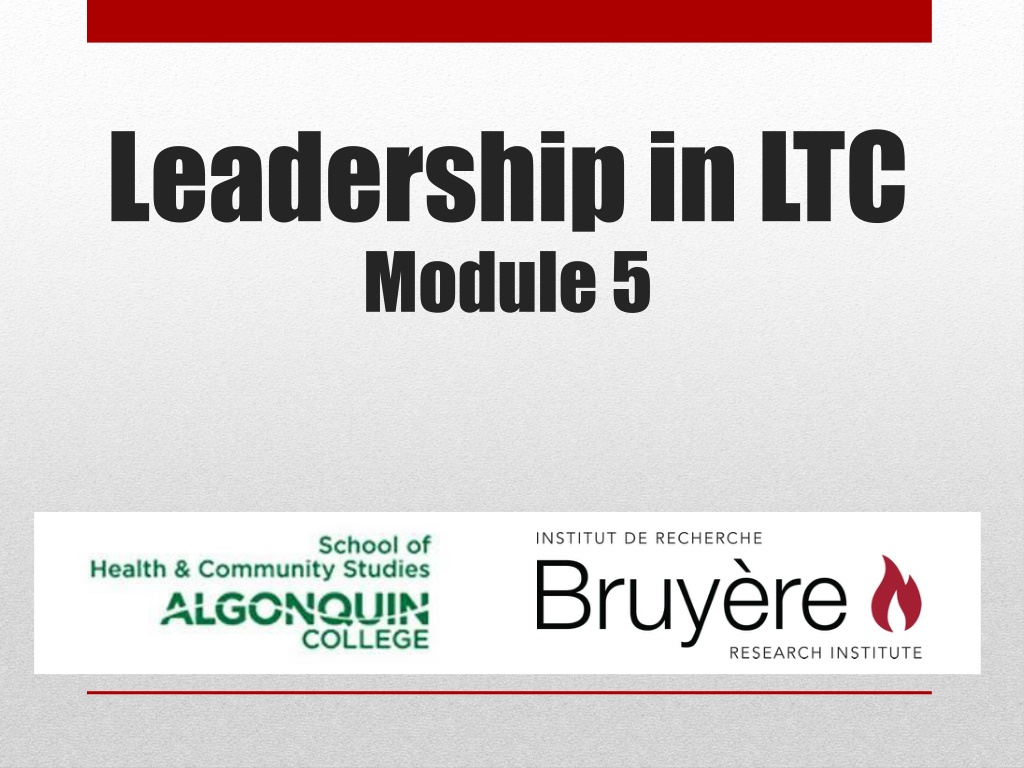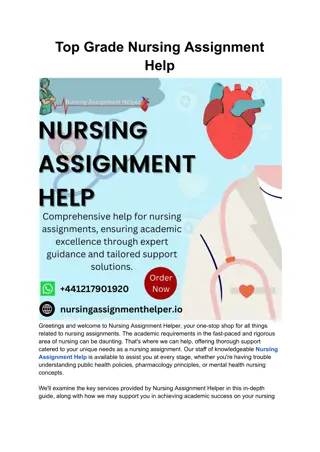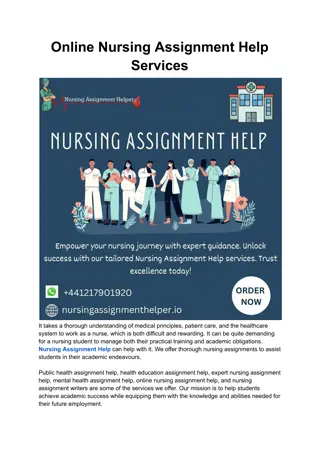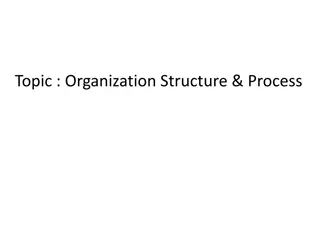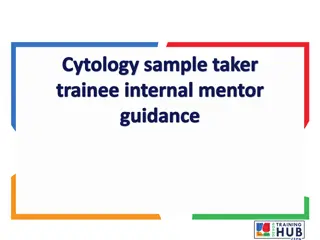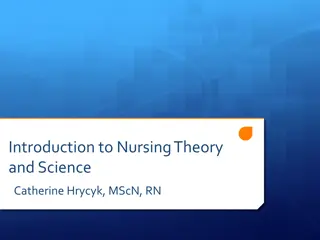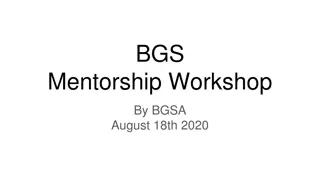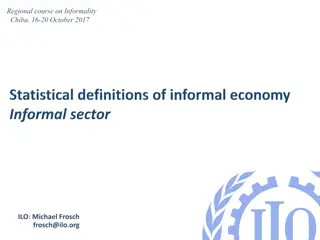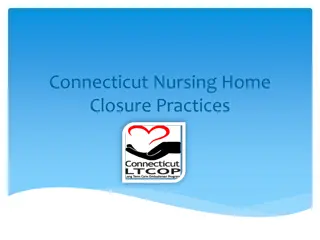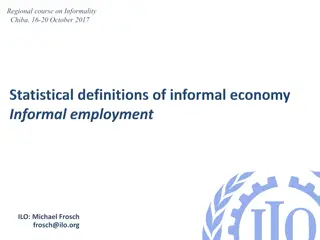Exploring Mentorship in Nursing: Understanding Formal and Informal Relationships
Delve into the world of mentorship in nursing through Module 5, focusing on defining formal and informal mentorship, identifying mentor and mentee skills, reflecting on personal readiness, finding mentors, and structuring mentorship relationships. Explore the impact of mentors, the College of Nurses of Ontario guidelines, and the self-fulfillment and value gained through mentorship.
Uploaded on Sep 18, 2024 | 0 Views
Download Presentation

Please find below an Image/Link to download the presentation.
The content on the website is provided AS IS for your information and personal use only. It may not be sold, licensed, or shared on other websites without obtaining consent from the author. Download presentation by click this link. If you encounter any issues during the download, it is possible that the publisher has removed the file from their server.
E N D
Presentation Transcript
Leadership in LTC Module 5
MENTORSHIP: CHANGING THE SCENE
Define formal and informal mentorship in the context of nursing Understand the skills associated with being a mentor and mentee Reflect on personal mentorship readiness and qualities Discuss strategies for finding a mentor Discuss ways to define and structure the mentorship relationship Objectives: Module Objectives: Module 5 5
Can you think of someone who you feel has been a mentor to you? How were they a mentor to you? Did you seek them out or were just there? What words come to mind when you think of mentor? Let s Reflect ..
Informal or Formal Process Informal mentoring Formal mentoring Mentorship
when people tell us about the leaders who really make a difference in their lives, they frequently tell us about people who believe in them and encourage them to reach beyond their own self-doubts, to more fully realize their own greatest strengths. (Kouzes & Posner, 2003) Mentorship
involves a voluntary, mutually beneficial and usually long-term professional relationship. Involves a mentor and a mentee (Donner & Wheeler, 2007) It is a Process that ..
College of Nurses of Ontario: It is our professional obligation to mentor CNO, (2009). Practice Guideline: Supporting Learners. Suhttp://www.cno.org/globalassets/docs/prac/44034_supportlearners.pdfpporting learners Guidelines
MENTOR MENTEE Enhanced self-fulfillment Increased feeling of value Increased learning, personal growth Motivation for new ideas Potential for career advancement Increased competence Increased confidence Decreased stress Increased job satisfaction Expanded networks Leadership development Insight in times of uncertainty (CNA, 2004) Benefits of Mentorship
Chance to grow through helping others Learn through mentorship Being a Mentor
The CNO has identified four key domains: Personal attributes Modelling excellence in professional practice Fostering an effective mentor/mentee relationship Fostering growth Mentor Competencies
Non- judgmental Open minded Reflective Respectful Empathic Realistically optimistic Mentor: Personal Attributes
Create a list of attributes and behaviours that a good mentor should have. Encourages Supports me Listens to me Assesses me Helpful Shares wisdom Give and take Mentor: Personal Attributes
Determine needs Determine roles and expectations of both Mentoring includes coaching, confirmations, accepting, friendship, protection, and sponsorship (Snelson, et al., 2002) Purpose is to achieve safe effective outcomes Transformational leadership supports this Relationship Between Mentor/Mentee
Someone who requires unique development o Someone going through change (Goode, 2012) Not a passive experience See checklist and skills to be a mentee What is a Mentee?
The CNO has identified four key domains: Collaboration Personal attributes Facilitation of learning Professional practice Knowledge of the setting Mentee Competencies
Look for someone with experience: Patient Well respected Enthusiastic Sense of humour Leadership style matches your own Does not have to be a nurse Finding a Mentor
Building Relationships & Negotiating Agreement
Building Relationships & Negotiating Agreement Checklist of Tasks Skills for Successful Mentoring Do s and Don ts First Meeting Tool Mentoring Agreement
DEVELOPING MENTEE/MAINTAINING MOMENTUM Checklist Meeting tool Development Activities and Plan Strategies Potential Challenges
Mentee critical skills checklist Mentee task list Mentor motivation inventory Mentorship agreement contract Mentorship Tools
Planning for mentoring Building the relationship/negotiating agreement Developing mentee/maintain momentum Ending the formal relationship Mentorship Process
Maya Angelou: In order to be a mentor, and an effective one, one must care. You must care. You don't have to know how many square miles are in Idaho, you don't need to know what is the chemical makeup of chemistry, or of blood or water. Know what you know and care about the person, care about what you know and care about the person you're sharing with. So if you know how to change a tire and that's all, that's good. But teach them by showing, by caring that they know these things
Canadian Gerontological Nursing Association (2010). Gerontological Nursing Competencies and Standards of Practice 2010. Retrieved from: http://www.cgna.net/uploads/CGNAStandardsOfPractice_English.pdf Canadian Nurses Association. (2004). Achieving excellence in professional practice: A guide to preceptorship and mentorship. Ottawa, ON: Author. Retrieved from: https://www.cna-aiic.ca/en/download- buy/preceptorship-and-mentorship Donner, G.J., & Wheeler, M.M. (2007). Mentoring as a leadership development strategy. The Canadian Nurse, 103(2), p. 24. References
Goode, M.L. (2012). The role of the mentor: a critical analysis. Journal of Community Nursing, 26(3), p. 33-34. Kouzes, J.M & Posner, B.Z. (2003). The leadership challenge (3rd ed.) San Francisco: Jossey-Bass. Snelson, C.M., Martsolf, D.S., Dieckman, B.C., Anaya, E.R., Cartechine, K.A., Miller, B., Roche, M., & Shaffer, J. (2002). Caring as a theoretical perspective for a nursing faculty mentoring program. Nurse Education Today, 22(8), p. 654-660. Tourigny, L., & Pulich, M. (2005). A critical examination of formal and informal mentoring among nurses. The Health Care Manager, 24(1), 68-76. Zachary, L. J. (2000). The mentor's guide: Facilitating effective learning relationships. John Wiley & Sons. References
